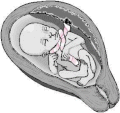Nuchal cord

Editor-In-Chief: Prab R Tumpati, MD
Obesity, Sleep & Internal medicine
Founder, WikiMD Wellnesspedia &
W8MD's medical weight loss NYC, sleep center NYC
Philadelphia medical weight loss and Philadelphia sleep clinics
| Nuchal cord | |
|---|---|

| |
| Synonyms | |
| Pronounce | N/A |
| Specialty | N/A |
| Symptoms | Usually none, but can include fetal distress |
| Complications | Hypoxia, stillbirth |
| Onset | During pregnancy |
| Duration | Until birth |
| Types | N/A |
| Causes | Umbilical cord wrapping around the fetal neck |
| Risks | Long umbilical cord, excess amniotic fluid |
| Diagnosis | Ultrasound |
| Differential diagnosis | |
| Prevention | None |
| Treatment | Careful monitoring during labor and delivery |
| Medication | N/A |
| Prognosis | Generally good with proper management |
| Frequency | Occurs in about 10-29% of pregnancies |
| Deaths | N/A |



Nuchal cord is a medical condition that occurs when the umbilical cord wraps around the fetus' neck 360 degrees. This condition is relatively common and can occur during pregnancy, labor, or birth.
Causes[edit]
The exact cause of a nuchal cord is not known. However, it is believed to be related to the movements of the fetus within the womb. The umbilical cord, which connects the fetus to the mother's placenta, can become wrapped around the fetus' neck as it moves and turns.
Diagnosis[edit]
A nuchal cord can be diagnosed during pregnancy through an ultrasound examination. However, it is often not detected until birth. During labor, a healthcare provider may suspect a nuchal cord if there are changes in the baby's heart rate.
Treatment[edit]
In most cases, a nuchal cord is not a cause for concern and does not require treatment. During birth, the healthcare provider can usually slip the cord over the baby's head or clamp and cut the cord before the baby is delivered. In some cases, a Cesarean section may be necessary.
Complications[edit]
While a nuchal cord is usually harmless, it can sometimes lead to complications. These can include decreased blood flow to the baby, which can lead to a lower heart rate. In rare cases, a nuchal cord can cause stillbirth.
Images[edit]
-
Ultrasound showing nuchal cord
-
Nuchal cord free
-
Nuchal cord locked
See also[edit]
Ad. Transform your life with W8MD's Budget GLP-1 injections from $75


W8MD offers a medical weight loss program to lose weight in Philadelphia. Our physician-supervised medical weight loss provides:
- Weight loss injections in NYC (generic and brand names):
- Zepbound / Mounjaro, Wegovy / Ozempic, Saxenda
- Most insurances accepted or discounted self-pay rates. We will obtain insurance prior authorizations if needed.
- Generic GLP1 weight loss injections from $75 for the starting dose.
- Also offer prescription weight loss medications including Phentermine, Qsymia, Diethylpropion, Contrave etc.
NYC weight loss doctor appointmentsNYC weight loss doctor appointments
Start your NYC weight loss journey today at our NYC medical weight loss and Philadelphia medical weight loss clinics.
- Call 718-946-5500 to lose weight in NYC or for medical weight loss in Philadelphia 215-676-2334.
- Tags:NYC medical weight loss, Philadelphia lose weight Zepbound NYC, Budget GLP1 weight loss injections, Wegovy Philadelphia, Wegovy NYC, Philadelphia medical weight loss, Brookly weight loss and Wegovy NYC
|
WikiMD's Wellness Encyclopedia |
| Let Food Be Thy Medicine Medicine Thy Food - Hippocrates |
Medical Disclaimer: WikiMD is not a substitute for professional medical advice. The information on WikiMD is provided as an information resource only, may be incorrect, outdated or misleading, and is not to be used or relied on for any diagnostic or treatment purposes. Please consult your health care provider before making any healthcare decisions or for guidance about a specific medical condition. WikiMD expressly disclaims responsibility, and shall have no liability, for any damages, loss, injury, or liability whatsoever suffered as a result of your reliance on the information contained in this site. By visiting this site you agree to the foregoing terms and conditions, which may from time to time be changed or supplemented by WikiMD. If you do not agree to the foregoing terms and conditions, you should not enter or use this site. See full disclaimer.
Credits:Most images are courtesy of Wikimedia commons, and templates, categories Wikipedia, licensed under CC BY SA or similar.
Translate this page: - East Asian
中文,
日本,
한국어,
South Asian
हिन्दी,
தமிழ்,
తెలుగు,
Urdu,
ಕನ್ನಡ,
Southeast Asian
Indonesian,
Vietnamese,
Thai,
မြန်မာဘာသာ,
বাংলা
European
español,
Deutsch,
français,
Greek,
português do Brasil,
polski,
română,
русский,
Nederlands,
norsk,
svenska,
suomi,
Italian
Middle Eastern & African
عربى,
Turkish,
Persian,
Hebrew,
Afrikaans,
isiZulu,
Kiswahili,
Other
Bulgarian,
Hungarian,
Czech,
Swedish,
മലയാളം,
मराठी,
ਪੰਜਾਬੀ,
ગુજરાતી,
Portuguese,
Ukrainian





